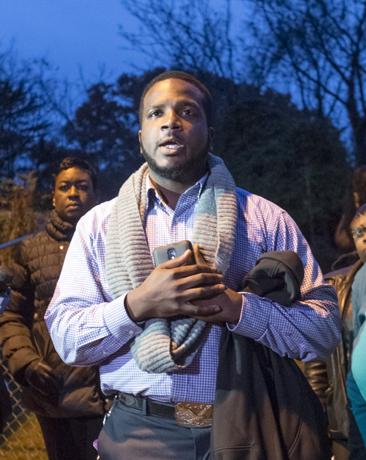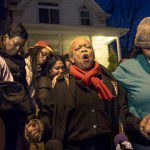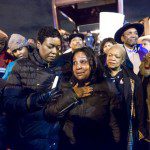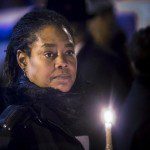Marion Barry: Mayor—Not for Life—But of Our Lives
By • December 4, 2014 0 2479

If there was one man, one politician, who in the annals of home rule in the District of Columbia personified the struggles and human makeup of this city, it was Marion S. Barry, Jr.
Through all the turbulent years of his public life in the city he seemed to love with a great passion, as school board member, city council member and four-time Mayor of the District of Columbia (1979 to 1991; 1995 to 1999.)
Through his triumphs of which there many, and through his troubles, of which there were an equal amount, Barry remained, up and down but not always all around the town, the most indelible, inspiring, divisive and unforgettable political figure of this town, the town inhabited in its neighborhoods, not its federal presence as capital city of the United States of America.
Even now, a day and some hours after he died early on Sunday morning a little after midnight, it’s hard to believe that he’s gone. He died of heart problems associated with his various medical issues including diabetes, after just being released from the hospital after complaining that he was not feeling well. In Washington, in the latter part of Barry’s life, the news of Barry landing in the hospital was practically a standing headline, but the news of his death was a shock.
He lived a big, big life here, footprints, imprints, images, accomplishments that irrevocably changed the city, and reckless and wounding acts that divided the city.
Long-term, the landscape changed. The geography of opportunity changed for the better for a time for African Americans in general, and those living in poverty, looking for jobs, for the elderly, the sick, the disadvantaged youths whom he inspired with his outsized presence, his outsider ways, his often in-your-face approach to white establishment types. He opened up opportunities for jobs in the District government which did not exist before, in its bureaucracies and its police and fire departments. When he was first elected—narrowly over the District’s first popularly elected mayor, Walter Washington—he was young and electric, running on a slogan of “Take a Stand.” When he took office, the city was a town that was still suffering from the effects of the 1968 riots. Although no longer segregated, it had the look of a segregated city, complete with the desolation of run-down neighborhoods along the 14th Street corridor.
It turned out that Marion Barry, as a politician, was something of a natural, like Bill Clinton, a man who couldn’t live without the hurly burly of crowds, meetings, face-to-face contacts. He was more often than not supremely confident in the pubic arena. If his major share of constituents was among the less affluent, heavily black areas of the city, especially when his last base of power became Anacostia and Ward 8, he was comfortable, and uniquely himself in just about any setting. We can recall Barry coming to Citizen Association of Georgetown meetings, where he had some vehement foes, and controlling the meeting by dint of his presence.
The city continued to change. And after the 1990 scandal—the videos of the Mayor of the District of Columbia taking a hit from a crack pipe, “The bitch set me up,” which became a t-shirt slogan, the trial, the journey to prison and the triumphant release—Barry had changed, too. He would be re-elected mayor for a term that was highlighted by the imposed presence of a federally mandated control board which took away almost all his power.
He opted out, not to run again. In 2004, he won the Ward 8 council seat and had been there until his death.
He felt himself redeemed often, and often stumbled, here and there. His talk got him into trouble. His bad habits got him into trouble. He could be racially divisive.
But he was always in the arena. Always.
Everybody who lived here during the Barry years has strong feelings about him, one way or the other, which came as no surprise. Often, it depended on where you lived, who you were or what you were. Often, opinions fell along racial lines.
All that aside, we remember him. Very little time passed over the years when he did not make news. But in Ward 8, he had returned and found a home. His personal life was as turbulent as his public life—four marriages, all ended, and one son, Christopher Barry.
We interviewed him in 2004, when he was seeking to gain the Ward 8 seat. He had said then that he was running because people kept asking him to, that he couldn’t get through a trip to a grocery store without talking for hours with residents.
We met him at his campaign headquarters which was only a block away from the Players restaurant, where we would have lunch (chicken dumpling soup, a favorite). It took us 45 minutes to get there. People at bus stops would hail him or come up to him. An elderly woman touched his hand to “God bless” him, and Barry knew her by name and asked after her grandchildren and health. Young men would look at him in awe. Nothing that happened on that walk was anything less than genuine. Pressing the flesh, a respectful listening to problems. Barry was in his element.
Outgoing Mayor Vincent Gray, who experienced his own share of political and personal troubles, choked up announcing his friend’s death. There was a similar, and emotional moment in 2010, when Barry was stripped of a chairmanship and censured by the District Council as a whole. Gray, stoic but dignified, read off the bill and Barry’s colleagues, one by one, voted (often whispered and muttered) yea on the censure motion, while Barry pleaded with Gray not to proceed.
We remember him too taking on a DPS employee during hearings on potential large-scale layoffs of teachers—in another room, teachers in danger of being fired cheered him in.
We remember him not so long ago over lunch for a story about his autobiography, “Mayor for Life.” He was walking slower but ate with a hearty appetite. He recalled the details of growing up in the segregated south as a poor African-American child, daring to drink out of a whites-only fountain just to see what it was like. He said he had no faith in the idea of the slogan, “One City,” as touted by Mayor Gray. He called it a pipe dream.
There will be no more quotes, outrageous or inspiring. There will be commemorations and vigils to come. Many are saying that the big memorial will come next week after Thanksgiving.
But there will be no more headlines except the last one. In the minds of the people who were there over the course of his time in this city, he will remain the mayor—not for life—but of our lives in his times.
- Marion Barry’s godson Dennis Harvey says the family is in good spirits. | Erin Schaff
- Nora Birch





